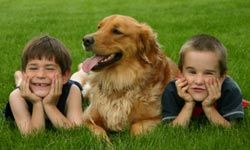 “A family’s best friend may be a hunting dog like this golden retriever.iStockPhoto/Thinkstock
“A family’s best friend may be a hunting dog like this golden retriever.iStockPhoto/Thinkstock
"Wanted: Dog that loves people, especially children. Must like taking neighborhood walks and playing catch in the yard; flushing game from the forest and driving deer are OK."
The qualities desired in this classified ad don’t exactly mesh, but these are what you could expect if you chose a hunting dog for your family pet. Of course, this begs this question "Why would you choose a hunting dog for your family?"
Well, the characteristics of a good hunting dog often match those that families look for in pets. These dogs tend to be obedient, easily trained, loyal and healthy, as well as good with people and other animals since they often run in packs. So, whether you handle a rifle or not, there are some hunting breeds that might make great dogs for your family.
Dogs have long helped hunters, stalk and find prey, whether it was to fulfill basic needs or just for sport. There are several different categories of hunting dogs:
- Hounds and trackers use their noses, trailing scents from all types of game.
- Pointers and setters identify prey with their body language, pointing or "setting" by their quarry.
- Retrievers recover the shot animals.
- Spaniels do it all — flushing out the prey and then retrieving it for their hunters.
[sources: The Hunting Dog, Hawkins].
All of these can potentially make great family dogs. Let’s take a closer look at five of these fine canines.
Contents
- Irish Setter
- Golden Retriever
- Weimaraner
- Chesapeake Bay Retriever
- Bloodhound
5: Irish Setter
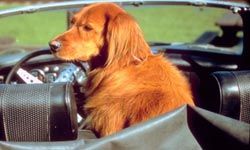 “Irish setters love to be with their owners and will adapt to riding in a car.JupiterImages/Photos.com/Thinkstock
“Irish setters love to be with their owners and will adapt to riding in a car.JupiterImages/Photos.com/Thinkstock
This dog stands out in a crowd, not just for its beautiful red coat but also for its vivacity. The Irish Setter is an intelligent, friendly dog, and loves to be part of a family, albeit the right family. Because this dog is so energetic, it’s not the best choice with small children. An owner needs to allocate time, energy and patience to this pet, and since these dogs mature slowly, the puppy-like mischievousness and playfulness can linger [source: Irish Setter Club of America]. Additionally, this dog needs plenty of exercise. An ignored Irish Setter will be skittish, hyperactive and sometimes destructive, as well as untidy since its coat needs regular grooming [source: Coile].
But, with the right owner, this dog is a wonderful companion. Training takes time, but this pet won’t forget a lesson once it’s learned. It’s an outgoing, social dog, so it does well around people and other pets. The Irish Setter Club of America dubs this breed’s temperament as "rollicking." But, this multi-talented dog can rollick in the fields by day and sit with the kids after dinner — not bad for a day’s work.
Though known as a family dog, the Irish Setter was originally bred to "set" game — that is to crouch low near the bird so the hunter could throw a net over the dog and bird to capture the prey. This dog is loyal, tireless and enthusiastic — a great combination on a hunt or with a family.
4: Golden Retriever
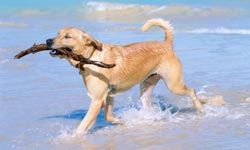 “Golden retrievers enjoy walks, swimming and — yes — retrieving objects.Thinkstock Images/Comstock/Thinkstock
“Golden retrievers enjoy walks, swimming and — yes — retrieving objects.Thinkstock Images/Comstock/Thinkstock
This dog is a notch above when it comes to being a family dog. It is loving, affectionate, great with children and adults, obedient and loyal. It is also intelligent, calm, gentle, and quick to respond. Because of its people skills, this popular breed is often trained to help physically disabled people [source: Fogle, "The Encyclopedia of the Dog"].
Breeders have developed different lines of golden retrievers for various purposes — gundog, show dog, family dog or assistant [source: Fogle, "The Encyclopedia of the Dog"]. While the golden is mostly known for family life, this dog began as a skilled waterfowl retriever. Today’s golden still possesses the instinct to retrieve and loves the physical exercise of a hunt. At home, you can fulfill these needs through outdoor games where the dog can chase and carry toys in their mouth [source: Coile].
Like almost any breed, this dog needs good training. Also, it needs some space to live and to exercise. For maintenance, brush your golden regularly; it sheds, so if you hate dog hair, the golden may not be for you. A final note — this dog is versatile, so whether you want it to stay at home, hunt birds or do both, it will not disappoint.
3: Weimaraner
 “Although Weimaraners are hunting dogs, they do not like to live outdoors. They like living indoors and spending lots of time with their owners.iStockPhoto/Thinkstock
“Although Weimaraners are hunting dogs, they do not like to live outdoors. They like living indoors and spending lots of time with their owners.iStockPhoto/Thinkstock
Known as the "grey ghost," due to its unique color, the Weimaraner is a beautiful, agile and noble breed. This dog is a good companion when hunting pheasant, quail or other upland birds thanks to a strong nose with excellent scenting ability. Sometimes called the "gentleman’s shooting dog," the Weimaraner is fast, but maintains an even pace so that its hunting companion can keep up [source: Fox].
Despite its hunting abilities the Weimaraner is also a great family dog. It is friendly, obedient, good with children, loves attention and affection, and enjoys being part of a family. However, be aware that the Weimaraner may not do as well with small kids or pets unless socialized from an early age because this dog is very active and energetic. Give this breed room and exercise otherwise you may be unhappy with the results — a perturbed Weimaraner won’t leave your household in good condition. The Weimaraner has a strong personality, so you need to be firm and confident when training this dog [source: Fogle, "Dog Owner’s Manual"].
The Weimaraner was originally only bred in Germany, but luckily for the rest of the world, an American made inroads and brought two of these canines back. As a hunting dog and a family dog, this breed has earned a loyal entourage.
2: Chesapeake Bay Retriever
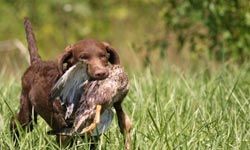 “Chesapeakes were bred to work hard and they do a lot better if they have a job — whether retrieving birds or balls.iStockPhoto/Thinkstock
“Chesapeakes were bred to work hard and they do a lot better if they have a job — whether retrieving birds or balls.iStockPhoto/Thinkstock
This dog gets its name from the shores of Maryland where it established itself as an excellent duck-hunter and water retriever. The Chesapeake Bay Retriever, or "Chessie" as this dog is nicknamed, is a hard worker, used to long cold swims to retrieve game. This is an intelligent, happy dog, with a quiet, non-excitable nature; it’s a good companion and great with children. This breed loves water so whether you’re a bird hunter or just a family that loves to visit the lake or the beach, the Chessie is a good choice. This dog needs lots of daily exercise, so long walks or romps are part of the routine. This breed also has a guardian-like nature, making it a good family watchdog [Fogle, "Dog Owner’s Manual"].
However, the Chessie needs lots of room, so a small home or lack of outside space won’t work well. For its beauty regimen, you want to brush your Chessie’s hair regularly. This is a double-coated dog with a long topcoat over a wooly undercoat that mats easily. This breed does shed, but unlike other double-coated dogs, it doesn’t shed its entire topcoat [source: Chesapeake Bay Retriever Relief & Rescue]. You will see increased topcoat shedding a few times a year [source: Fogle, Dog Owner’s Manual]. Whether you want a loyal hunting companion or a loving family dog, you can’t go wrong with the Chesapeake Bay Retriever.
1: Bloodhound
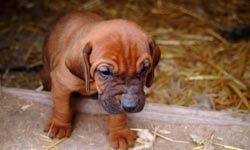 “This cute wrinkly bloodhound puppy will grow up to be a noble bloodhound, one of the few breeds that can distinguish and follow human scent.iStockPhoto/Thinkstock
“This cute wrinkly bloodhound puppy will grow up to be a noble bloodhound, one of the few breeds that can distinguish and follow human scent.iStockPhoto/Thinkstock
According to the American Kennel Club, this dog was once described as a "unique-looking dog in a baggy suit" because of its loose skin and large ears. Pretty may not come to mind when you look at this breed, but for a hunter or a family, the bloodhound deserves a good look.
Bloodhounds have been around since before the Crusades and are so-named because they were a noble dog, a "blooded hound." There are few dogs who trail a scent better than the bloodhound; evidence found by bloodhounds has even held up in court [source: American Kennel Club]. For the bloodhound, the thrill is in the chase, not actually killing the prey. This breed makes a great hunter and companion. So, how does it rate as a family pet?
This droopy dog is good with children and other dogs, reserved and not easily excited. It’s gentle and loving, but stubborn and so you need patience when training. This dog will take charge of your household if allowed, so establish who’s boss early. You don’t need a lot of space for your bloodhound as long as you give it lots of exercise. However, it can climb, jump or dig to escape a fence.
This slobbering, bumbling pet isn’t for everyone, but the faithful and kind temperament that make these dogs a hit on the hunt can work just as well with your family.
Lots More Information
Related Articles
- 10 Tips for Picking Out a New Family Dog
- 5 Gentle Giant Family Dogs
- Top 10 Family Guard Dogs
Sources
- The American Bloodhound Club "History of the Bloodhound.". (August 15, 2011). http://bloodhounds.org/page2/page22/history.html
- American Chesapeake Club. "Official Standard for the Chesapeake Bay Retriever." (August 14, 2011). http://www.amchessieclub.org/standard/standard.html
- American Kennel Club. "AKC Meet the Breeds: Bloodhound." (August 16, 2011). http://www.akc.org/breeds/bloodhound/index.cfm
- American Kennel Club. "AKC Meet the Breeds; Chesapeake Bay Retriever." (August 12, 2011). http://www.akc.org/breeds/chesapeake_bay_retriever/
- American Kennel Club. "AKC Meet the Breeds: Golden Retriever." (August 16, 2011). http://www.akc.org/breeds/golden_retriever/
- American Kennel Club. "AKC Meet the Breeds: Irish Setter. (August 16, 2011). http://www.akc.org/breeds/irish_setter/
- American Kennel Club. "AKC Meet the Breeds: Weimaraner." (August 13, 2011). http://www.akc.org/breeds/weimaraner/
- Chesapeake Bay Retriever Relief & Rescue. " Don’t Buy a Chesapeake Bay Retriever!" (August 22, 2011). http://www.cbrrescue.org/articles/dontbuy.htm.
- Coile, D. Caroline. "Encyclopedia of Dog Breeds." Second Edition. Barron’s Educational Series, Inc. 1998.
- Fogle, Bruce. "Dog: The definitive guide for dog owners." Firefly Books, Ltd. 2010.
- Fogle, Bruce. "Dog Owner’s Manual." DK Publishing. 2003.
- Fogle, Bruce. "The Encyclopedia of the Dog: The Definitive Visual Guide." DK Publishing. 2007.
- Fox, Susan. "Weimaraners." Barrons’ Educational Series, Inc. 2000.
- Hawkins, Kirsten. "Choosing a Good Hunting Dog." (August 11, 2011). http://www.theofficialanimalsite.com/hunting-dog.php
- The Hunting Dog. "The History of Hunting Involves Sight and Smell." (August 11, 2011). http://www.the-hunting-dog.com/history-of-hunting.html
- The Hunting Dog. "Breeds of Dogs with Lots of Versatility." (August 22, 2011). http://www.the-hunting-dog.com/breeds-of-dogs.html
- Irish Setter Club of America, Inc."This is the Irish Setter." (August 13, 201). http://www.irishsetterclub.org/breed_information.html
- Kennel Club Books Interactive Series. "Golden Retriever: A Smart Owner’s Guide." Kennel Club Books. 2009.
- North American Versatile Hunting Dog Association. "The Versatile Hunting Dog Breeds." (August 11, 2011). http://www.navhda.org/breeds.html
- World Book’s Animals of the World. "Golden Retrievers and Other Sporting Dogs." World Book, Inc. 2007.





























